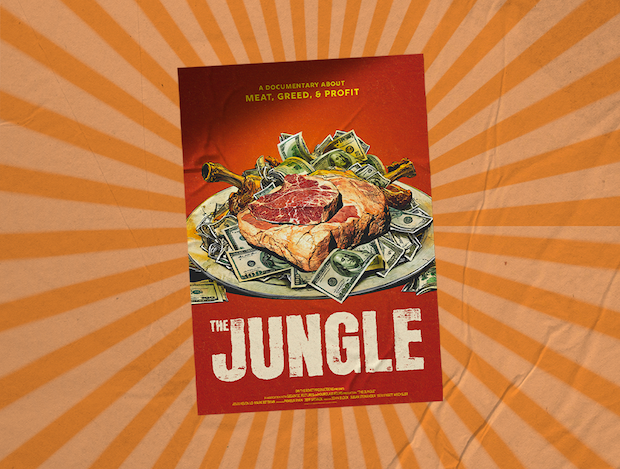Big Meat’s Threat to Our Economy, Communities, and Planet
Published May 5, 2025

The new documentary The Jungle unveils the harms of factory farming and corporate power in the meat industry, and the alternatives we can and must embrace.
North Carolina is hog country. It’s the second-biggest hog-producing state in the country, and most of its millions of pigs live in factory farms. These massive warehouses stuff hundreds of thousands of animals into tight confines to feed our country’s demand for meat. It’s a system where everyone — animals, neighbors, the environment, people at the grocery store — loses, except the meat corporations running the show. Their wealth and power have only grown in recent decades.
“There’s this lost love of pork because of commercial factory farms here,” says Derrick Jackson in a new documentary, The Jungle. Derrick and his wife, Paige, run one of the few North Carolina farms that raise their hogs on pasture, where they can roam and be part of an ecosystem. “I believe that we should steward creation in a way that reflects something bigger than ourselves,” Paige says.
The Jungle, directed by Matt Wechsler, is a modern take on the 1906 Upton Sinclair novel that exposed the dark underbelly of the meat industry at the time. Sinclair’s Jungle inspired the public to take action for stronger food safety regulations that we still benefit from today.
But since then, the meat industry has gotten bigger, less sustainable, and more harmful to our health, environment, and economy. And as today’s The Jungle documentary shows, we can blame that on the industry’s consolidation into fewer and bigger corporations — and the government policy that encouraged it.
For April’s Livable Future LIVE, we hosted a digital screening ahead of The Jungle’s official release this fall. Afterward, Krissy Kasserman (Factory Farm Organizing Director based in North Carolina) sat down with director Matt Wechsler. Together, they discussed the film, the impact of factory farms and the meat industry, and the alternatives we must fight for.
How Big Meat Hurts Us All
In recent decades, government policies have allowed factory farms and the power of the meat industry to grow in tandem. They’ve enabled corporations to do all they can to push down costs and capture more profits.
The Jungle introduces us to workers who lose movement of their hands, as slaughterhouses ramp up line speeds to an unsustainable pace. It explains how factory farms spray billions of pounds of waste cheaply onto fields, where the runoff enters streams and contaminates our water. We meet pork and poultry farmers who can no longer grow independently of Big Meat corporations or lose their farms entirely; we see one of the many rural towns hollowed out by the growth of Big Agribusiness.
The size of Big Meat corporations has allowed them to dictate everything from working conditions to prices. For example, during the pandemic, Food & Water Watch exposed how corporations, including meat giants, raised food prices to boost their profits.
In this way, Matt told us at the event, our modern meat system is no longer about providing food: “It’s about controlling food and controlling people’s ability to access it.”
The Solutions in Indigenous Knowledge and Policy Change
The Jungle begins with the buffalo that once roamed the Great Plains. For the region’s Indigenous people, buffalo were a source of meat and of great spiritual and cultural importance. But as European colonizers moved West, their genocide of Native Americans and of buffalo went hand-in-hand. In just a few decades, buffalo populations plummeted from several million to a few hundred.
Buffalo are a keystone species that help create diverse ecosystems. They stand in direct opposition to the modern factory farm, which takes animals out of nature. For Matt, buffalo represent the alternatives we have. “I think it’s important to note that there was a food system that existed in North America, and it did feed people,” he told us.
The Jungle shows that the answers to a fair, sustainable food system have long existed. Farmers like Reginaldo Haslett-Marroquin are sharing better ways of growing, rooted in Indigenous knowledge. Raising chickens amongst hazelnut trees and pigs on pasture; bringing back the buffalo — in stewarding native species amid thriving ecosystems, we can feed ourselves and take care of the land. More farmers, like Derrick and Paige Jackson, are taking these lessons to their farms and communities.
Crucially, Krissy reminded us, achieving this transformation will require more than individual changes.
“We should absolutely do whatever we can in our own lives to embrace and participate in something that’s more sustainable and regenerative,” she said, “But getting rid of factory farms will require us to change the fundamental structure of the food system. It was bad policy that brought us here, and building a better food system will require policy change.”
We need collective action to end policies that have built today’s corporate-controlled, industrial food system and push for ones that foster sustainable, local, regenerative agriculture.
Learn More About Our Corporate-Controlled Food System in the Full Talkback
Check out Matt and Krissy’s full conversation to learn more about:
- Policy fights and legal battles that Food & Water Watch is taking on to defend farmers and families from Big Ag;
- The climate, air, and water impacts of factory farming and Big Ag;
- How Big Ag corporations, policy choices, politicians, and regulators have built today’s industrial food system; and
- Advice on what choices we can make to support a fair, sustainable food system.
Resources Shared at the Event
- Learn more about Matt Wechsler and his films, including Sustainable and Right to Harm, at hourglassfilms.com. Plus, check out where you can watch The Jungle when it’s officially released!
- Read more about Food & Water Watch’s recently filed motion to intervene in a federal lawsuit that defends protections for farmers and ranchers under the Packers and Stockyards Act.
- Interested in a deep dive on the dangers of factory farms? Check out Food & Water Watch’s Factory Farm Nation report.
- Join us for our 20th Anniversary Benefit: Against All Odds! In celebration of two decades of wins, we will be gathering in community and solidarity at a virtual conference on May 13. Read more about the event and get your tickets.
- We have various volunteer teams and events happening across the country. Check out all the opportunities to get involved!
- The generosity of supporters like you powers our work fighting for a fair, sustainable food system. Make a gift today.

Your presence is requested!
We are celebrating our 20 years of~grassroots power — join us in~person or virtually!
Enjoyed this article?
Sign up for updates.
TO TOP


